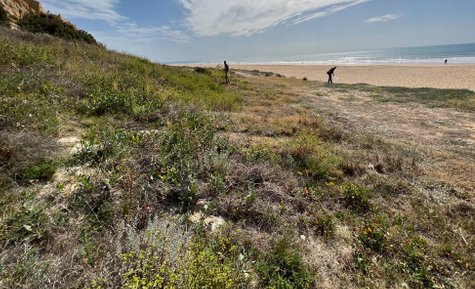The registration formulaire for the 2023 European Bee Course is available here.
The registration fees are 950 EUR per person (750 EUR for AEET / EBD members), which includes accommodation and food from Monday to Thursday (4 nights, 5 days) and a bus transfer from Seville to Doñana biological Station. Travelling to and from Seville to your home is at your own costs.
Note: a detailed and updated program will be shared with the participants prior to the Bee Course.
When?
March 13-17, 2024. Arrival on March 12, departure on March 17.
Application deadline?
December 22, 2022. We plan to select the candidates over Christmas and notify them by January 15, 2023 at the latest.
Attendees?
15 students, PhDs and Postdocs have priority but undergraduate students and young professionals are also encouraged to apply. The course is aimed at people with intermediate bee identification skills who wants to get experience in identifying at genus and species level, and learn more about bee ecology.
Instructors?
Hosted by Dr. Ignasi Bartomeus and Mr. Curro Molina (Estación Biológica de Doñana, Andalucia, Spain) with the co-supervision by Mr. Stuart Roberts and Prof. Nicolas J. Vereecken (Université libre de Bruxelles, Belgium).
Program outline
- Day 1
8h00: Bus departure at meeting point in downtown Sevilla (TBA)
10h00 - 10h15: Welcome speech by the host.
10h15 - 12h30: Ice-breaking session : Flash presentation by each trainee + questions.
12h30 - 14h00: Lunch break & discussions
14h00 – 14h30: Diversity of wild bees in Europe - an update (SPM Roberts)
14h30 – 16h30: A primer of wild bee ecology and ecosystem services in Europe (NJ Vereecken)
16h30 – 17h00: Break & discussions
17h00 - 17h30: The bees of the Doñana Nature Reserve (I Bartomeus & C Molina)
- Day 2
9h00 - 11h00: Introduction to the bee genera of Europe (laboratory) (SPM Roberts & NJ Vereecken)
11h00 – 12h00: Field surveys - what's in my bag? (SPM Roberts)
12h15: Departure for field trip.
12h30: Lunch in the field.
13h00 - 16h00: Field surveys in the Doñana Nature Reserve (ALL)
17h00-18h30: Back to the lab and preparation of the collected specimens (ALL)
- Day 3
9h00 - 11h00: Preparation of the collected specimens and identification of the bee genera (ALL)
11h-11h30; Break & discussions
11h45: Departure for field trip.
12h00: Lunch in the field.
12h30 - 16h00: Field surveys in the Doñana Nature Reserve
17h00-18h30: Back to the lab and preparation of the collected specimens
- Day 4
9h00 - 11h00: Preparation of the collected specimens and identification of the bee genera (ALL)
11h00 - 11h30; Break & discussions
11h30 - 12h30; Plant-pollinator networks, lights and shadows of a powerful tool (I Bartomeus)
13h00 - 14h00: Lunch and discussions
14h00 - 15h00: Red List of European bees: from country to continent (SPM Roberts)
15h00 - 16h00: Break & discussions
16h00 - 18h30: Identification of the bee genera + examination (ID test) (ALL)
- Day 5
09h00 - 10h00: Advances in wild bee community structure analysis (NJ Vereecken)
10h00 - 10h30: Break & discussions
10h30 - 12h00: Citizen sciences and wild bee biological records (SPM Roberts & NJ Vereecken)
12h00 – Bus from Doñana to Sevilla Downtown. Lunch at Seville (self-organized).

The Bee Course will offer a 2023 session in the beautiful Doñana Nature Reserve of Andalucia (Spain), from March 13-17, 2023.
The Bee Course instructors for this session in Andalucia will include our hosts Prof. Ignacio Bartomeus and Mr. Curro Molina (Estación Biológica de Doñana), as well as bee experts Mr. Stuart P.M. Roberts (Scientific collaborator at the Université libre de Bruxelles, Belgium) and Prof. Nicolas J. Vereecken (Université libre de Bruxelles, Belgium).
All Bee Course instructors will share their knowledge on the diversity of bees, their identification and their ecological relationships in Mediterranean Europe.
Website designed by NJ Vereecken (2022) / All photos © NJ Vereecken